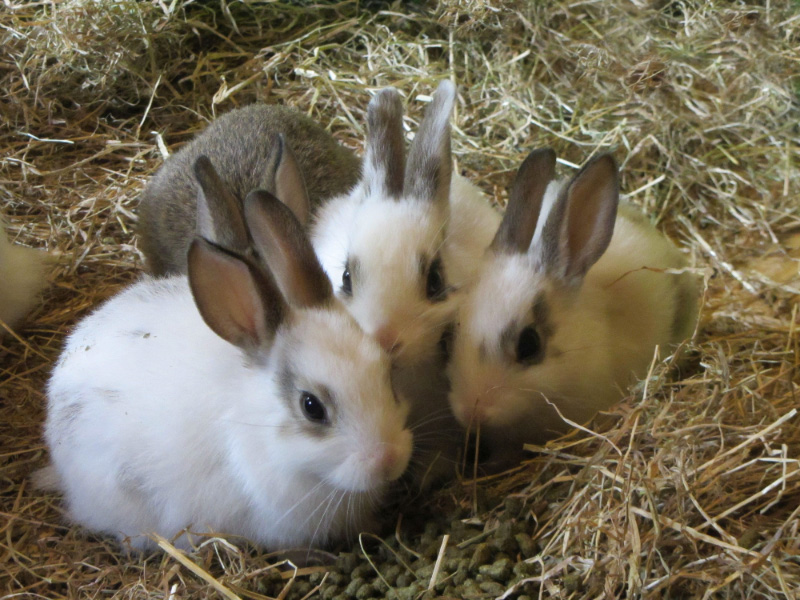RVC study helps to fill the evidence gap on UK pet rabbit health
Academics from the Royal Veterinary College (RVC) have identified the most common medical issues and causes of death in pet rabbits, research which has never been done before.
Carried out as part of the RVC’s VetCompass™ programme, the study now gives us a much better picture of what needs to be done to keep the species, a popular pet among adults and children, healthy.
After collecting data from 6,349 rabbits that attended 107 veterinary care clinics across the UK, the researchers found that the most common causes of death recorded by vets are flystrike (10.9% of pet rabbits), anorexia (4.9%), collapse (4.9%) and gut stasis (4.3%). The study also revealed the average lifespan of pet rabbits was just 4.3 years, although survival up to 14.4 years has been recorded. Male rabbits tend to live longer at 5.2 years on average compared to the 3.7 years females live on average.
Meanwhile, the most common medical issues are overgrown nails (16%), overgrown molars (7.6%), dirty bums (4.5%), overgrown incisors (4.3%) and gut stasis (4.2%). Many of these problems are associated with inappropriate housing or feeding. However the fact rabbits evolved as a prey species has not helped owners and vets. Evolution has meant rabbits can disguise external signs of disease so that they are less likely to be targeted by predators but this also makes it harder for owners to spot that their rabbit is ill until it is often too late.

Thanks to this new RVC VetCompass study, owners and veterinarians now finally know what the most common disorders within the UK pet rabbit population are, and can therefore prioritise what signs of illness need to be monitored.
Other key findings by the researchers included:
- Male rabbits are more likely than females to have overgrown claws, overgrown molars, overgrown incisors and dental disease.
- The average age of pet rabbits presented to vets is 3.2 years in this country.
- The average adult bodyweight of rabbits presented to vets is 2.1kg.
Dr Dan O’Neill, VetCompassTM researcher and Senior Lecturer at the RVC, said: “For years, rabbits were considered as the perfect child’s pet: fluffy, cute, passive and only needing minimal care and handling while being fed muesli-type food in a hutch in the garden where it was generally kept on its own. We now know that this level of care is completely unacceptable from a welfare perspective. This new paper can further improve the lives of rabbits by helping owners and vets to recognise the common health problems of rabbits and therefore to prioritise the key management factors that will make our rabbits even healthier. Rabbits don’t exhibit their suffering like other species so it behoves all of us to be prevent and recognise their problems.”
Dr Jo Hedley, VetCompass researcher and Lecturer at the RVC, added: “This study definitely highlights some of the most common presentations seen in pet rabbits. Unfortunately, due to the rabbit’s ability to hide disease, signs of a problem are often non-specific and recognised far too late, hence the causes of death recorded are in fact often just end-stage symptoms of underlying disease. Many of the key medical issues are still problems that we should be able to completely prevent by appropriate husbandry, diet and health checks. Better owner education is necessary if we are to improve rabbit health and welfare in future years.”
Research Reference
O'NEILL, D. G., CRAVEN, H. C., BRODBELT, D. C., CHURCH, D. B. & HEDLEY, J. 2019. Morbidity and mortality of domestic rabbits (Oryctolagus cuniculus) under primary veterinary care in England. Vet Record. https://doi.org/vetrec-2019-105592
Notes to Editors
For more information please contact:
- Ploy Radford (ploy.radford@plmr.co.uk) or Jasmin De Vivo (Jasmin.DeVivo@mangomarketing.com)
- Press Line: 0800 368 9520
About the RVC
- The Royal Veterinary College (RVC) is the UK's largest and longest established independent veterinary school and is a constituent College of the University of London.
- The RVC is ranked as the world’s number one veterinary school in the QS World University Rankings 2019.
- The RVC offers undergraduate, postgraduate and CPD programmes in veterinary medicine, veterinary nursing and biological sciences.
- The RVC was the first veterinary school in the world to hold full accreditation from AVMA, EAEVE, RCVS and AVBC, and currently holds full accreditation from RCVS, AVBC and AVMA and conditional from EAEVE.
- In 2017, the RVC received a Gold award from the Teaching Excellence Framework (TEF) – the highest rating a university can receive.
- A research-led institution, the RVC maintained its position as the top veterinary institution in the Research Excellence Framework (2014), with 79% of its submission being rated as world-class or internationally excellent.
- The RVC also provides animal owners and the veterinary profession with access to expert veterinary care and advice through its teaching hospitals: the Beaumont Sainsbury Animal Hospital, in central London, and the Queen Mother Hospital for Animals (Europe's largest small animal referral centre) and Equine Referral Hospital, both located at the Hertfordshire campus.


